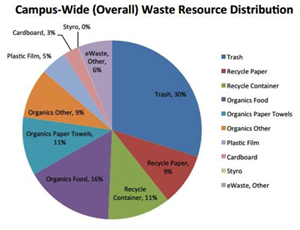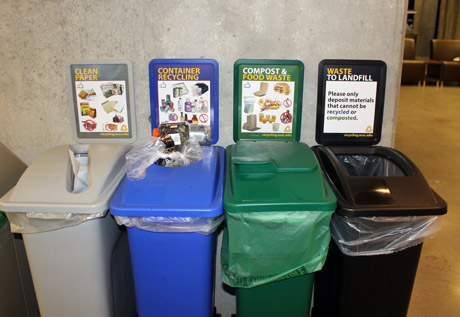Campus News
Composting bins promote a handy diversion toward 2020 zero-waste goal
The first zero-waste stations at McHenry Library are in place, another step toward a goal of making the campus zero-waste by 2020.


The first zero-waste stations at McHenry Library are in place, another step toward a goal of making the campus zero-waste by 2020.
As part of a pilot program, four-stream waste stations were set up for trash, paper, container recyclables, and compostable waste. It follows the installation last February of zero-waste stations at the Humanities 1 building. If the pilot proves successful additional stations will be established at other campus buildings.
The project was made possible through a collaboration among UC Santa Cruz Grounds Services, Custodial Services and the Sustainability Office.
Key to the project’s success is the care users take to separate their materials, said Elida Erickson, sustainability programs manager in the UC Santa Cruz Sustainability Office. “It’s extremely important for users to look at the signs on the bins and make sure they are placing their items in the correct bin, to prevent ‘contamination’ of material streams.
“Those extra few seconds to make sure you’re choosing the right bin can make all the difference,” Erickson said.
Chancellor Blumenthal has committed the campus to attain the UC president’s goal of reaching zero waste by the end of the decade. Zero waste means diverting all waste from landfills. For 2013-2014, 63 percent of UC waste was diverted away from landfills.
Christian Monzon, a junior majoring in environmental studies and ecology and evolutionary biology, is the McHenry Zero Waste Pilot project coordinator. He said he hopes UC Santa Cruz will become the first zero waste campus in California, setting an example for other UCs.
He agrees that the sorting process is key and can be confusing. “I think that students and campus users have the desire to properly sort and dispose of their waste but it can often be confusing, especially since our waste collection is fairly inconsistent across campus,” Monzon said.
One of the largest portions of waste on campus is compostable material, such as food scraps, used paper towels, and Bioware cups, plates, and utensils that shouldn’t go to a landfill. However, no campus-wide composing solution exists yet. The McHenry Library pilot program integrates compost into the waste stream, with the goal of eventually phasing composting into more campus locations.
Besides four floors of Humanities 1 and McHenry Library, compost bins are all dining halls and the Owl’s Nest café at Kresge.